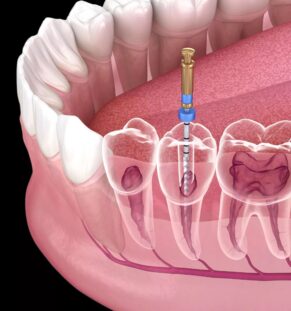

Dental
Root Canal Treatment
Our teeth are filled with nerves and blood vessels in the tooth pulp. In cases of damage or severe tooth decay that infects the pulp, bacteria can spread into the surrounding jaw bone through the tip of the roots, leading to severe swelling, pus, pain and fever.
If you are feeling swelling, tenderness when chewing, and pain that does not go away even with pain-killers, these may be signs that the pulp of your tooth is infected and that you should see our dentist. A root canal treatment can help to save and restore your tooth.
Details of root canal
What to expect
Root canal treatment will usually require 1 to 2 visits depending on the complexity of the condition.
At the first visit, our dentist will examine your tooth and take an X-ray to determine whether a root canal treatment is required.
During the root canal treatment itself, our dentist will provide a local anaesthetic to the affected area before removing the infected pulp. He will then disinfect the tooth to remove all bacteria, and shape the inside of your root canal. The cavity is then filled and sealed to prevent future infection.
After the root canal treatment, a crown or other restoration method can be used to protect the tooth and restore it to full function.
F&Q
People also ask
Is A root canal painful?
Since patients are given anesthesia, a root canal isn't more painful than a regular dental procedure, such as a filling or getting a wisdom tooth removed. However, a root canal is generally a bit sore or numb after the procedure, and can even cause mild discomfort for a few days.
How long will root canal last?
Teeth that receive a root canal and then a filling and crown last about 20 years. Teeth that receive either a filling or a crown after a root canal last about 11 years. Teeth that receive no restorative work after a root canal last about 6.5 years.
